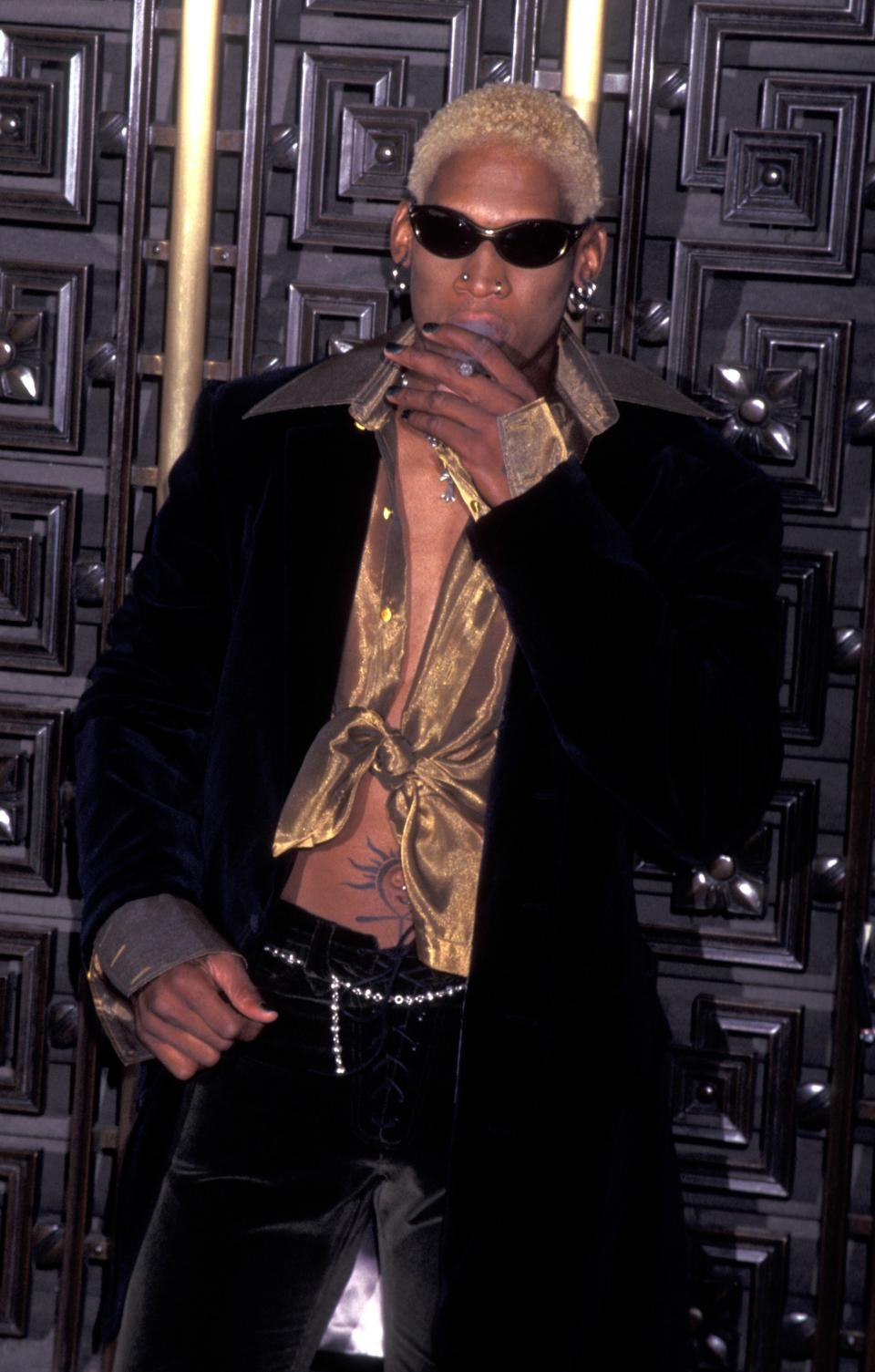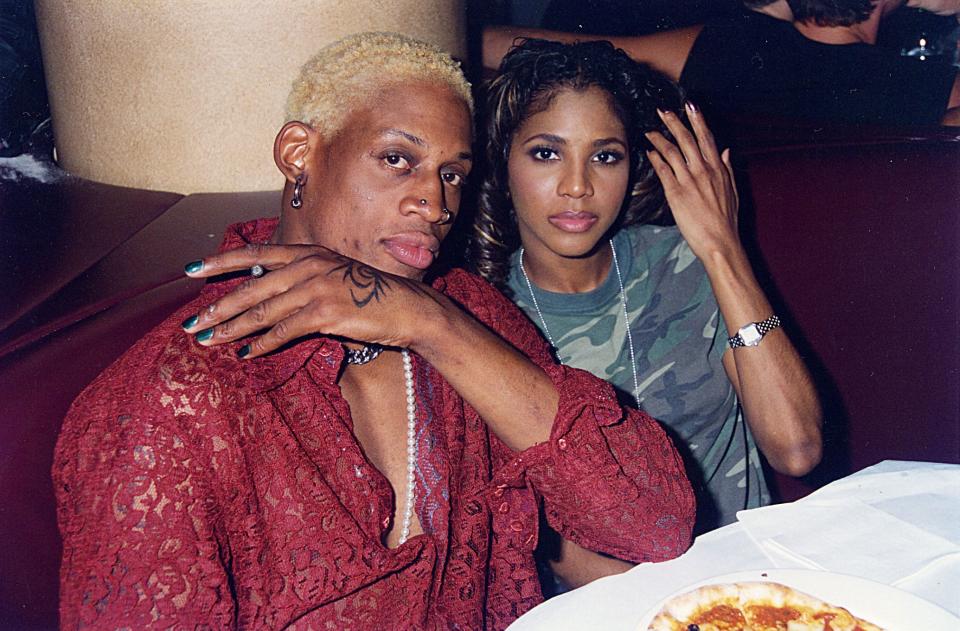How Dennis Rodman, '90s Outcast, Became Dennis Rodman, Style Godhead
In this universe, prophets get a tough shake. The passages dedicated to history’s most transgressive figures are almost always punctuated by exiles, burnings at the stake, crucifixions, cancellations. This, in part, explains why, during the peak of his notoriety, Dennis Rodman — the NBA’s rainbow-headed rebound savant — was unfairly dismissed as America’s strange, recalcitrant, septum-pierced nephew. It also explains why, today, he’s better understood as an insurgent, wildly ahead-of-his time style visionary. In the little over two decades since Rodman’s Madonna-courting, wedding dress-wearing celebrity zenith, the sartorial quirks that for the longest time saw the power forward-turned-pro wrestler-turned-walking Ed Hardy billboard-turned-diplomat relegated to the realm of pop culture sideshow have made him a sort of contemporary Patron Saint of Cool.
This revelation was recently enshrined in a tweet—a screengrab of Rodman’s August 1996 appearance on The Late Show with David Letterman. The then-Chicago Bull is wearing a sheer, black, floral-patterned burnout blouse buttoned no higher than his navel, if it’s buttoned at all. His nails are painted black. His eyes are protected by bug-eyed, Oakley wraparound sunglasses. He has three chains on: a silver cuban-link choker, a crucifix, and a longer one with a gold pendant. He’s sporting his trademark facial piercings — a silver ball in his right nostril, a silver hoop in his left, and a pair of massive captive bead, stainless steel earrings. His hair, of course, is bleached blonde, and further spray-dyed a splotchy kelly green. “Everyone in 2019 looks like dennis rodman in 1996,” @cowboybagel declared to the tune of 22,512 retweets and 73,155 likes.

And it’s true: the trail that Rodman blazed all those years ago has been rediscovered by a whole new generation of style agitators. His outré Marilyn Manson-meets-Prince-meets-Flea approach — with its seemingly random infusion of elements from rave culture, emo, hip-hop, and fetish wear — no longer feels that far out there. In fact, The Rodman is probably one of 2019’s more recognizable online style archetypes. I’m not saying that Dennis Rodman was the first e-girl, but I’m not not saying that.
For the uninitiated: the terms “e-girl” and “e-boy” refer to the growing subset of post-influencer Gen-Zers who spend all day online posting Facetune’d selfies in their new kawaii crop tops and spiked dog collar chokers, or as Vox’s Rebecca Jennings put it, they are “what would happen if you shot a teenager through the internet and they came out the other side.” The result is startlingly Rodman-esque. From their rotating carousel of hair colors to their gender-ambivalent incorporation of goth and BDSM elements, these kids are tidily following the blueprint the NBA Hall-of-Famer first began sketching a little over a quarter century ago.

It’s not just cool teens on the internet, either. Whether it’s Saturday Night Live star Pete Davidson’s garrish array of tattoos and occasional blonde mop, Jonah Hill doing this, or literally every single Soundcloud rapper, many celebrities have been sprinkling Rodman-like affectations into their personal style oeuvres. And why wouldn’t they? In a cultural moment increasingly concerned with divesting itself from historic conventions, you’d be hard pressed to find a more apt modern style muse.
In an era that liked to think of itself as more liberated than it perhaps actually was , Rodman was one of the handful of pop culture characters actually bothering to liberate himself from normative social constructs. He embraced a kind of gender fluidity and sex positivity that stood in hilariously stark contrast to, say, the pristine, brandsafe Michael Jordan Industrial Complex™ occupying another portion of the Bulls locker room. This, after all, is the man who, during his brief tenure with the notoriously regimented San Antonio Spurs, regularly spent his off nights partying in gay bars. The casting call for Space Jam was not coming any time soon.

It’s no coincidence that Rodman’s coronation as a contemporary #fitspo king comes during a recent vintage Y2K fashion boom. To say that the Space Traveller From the Future looks he sported in the early to mid 90s prefigured a louder, weirder, pop culture moment that was to come a few years later would be an understatement. Here he is during an interview ahead of the 1995 season, looking like a member of a failed early ‘00s ska punk band—and also a kid I saw on a skateboard in the Bowery last weekend. Back then, Rodman was opening a door, and while most were initially hesitant to step through, many seem to be rushing in now.
Perhaps most central to ‘90s Rodman’s appeal today is that he was an eccentric, enigmatic, and genuinely weird dude. It’s a rare, potent mix of authenticity that you just don’t see much anymore and something that our increasingly-online, metric-driven social worlds are endlessly in search of but don’t readily foster. In more ways than not, Rodman is a logical antecedent to subsequent unpredictable and often confounding cult figures like Lil B, Lil Uzi Vert, and Young Thug. Like Rodman, they’re people who’ve etched their mark on the pop culture psyche by defying the precepts of their given fields and doing things how they want to, when they want to, and simply because they want to.

Now, Rodman presents a slightly different story. Rodman, Global Diplomat, has been a decidedly more complicated episode than Dennis Rodman, Influential Dresser. But fascist dictator shoulder-rubbing notwithstanding, even his recent antics and weird uncle online social media persona continue to operate outside the normal, dry, and depressing confines of conventional social and political behavior.
Last fall, ESPN premiered the latest documentary in its 30 for 30 series, Dennis Rodman: For Better or Worse. Over the course of 90 minutes, we’re served a recitation of Rodman’s greatest hits — Madonna, the wedding dress, his pet parrots — which for anyone familiar with the seven-time rebound champion’s story feels routine. Still, despite the film’s well-worn retellings of his antics, one can still feel a sense of how singular Rodman was to the people around him. “Being an iconoclast in [the 90s],” The Ringer’s Brian Phillips wrote in his review of the film, “meant standing on a lonely cliff, without an online hive, without even an emoji to rally an online hive around.” True as that may have been, it didn’t stop Rodman from trying to look like a bee.
Originally Appeared on GQ

